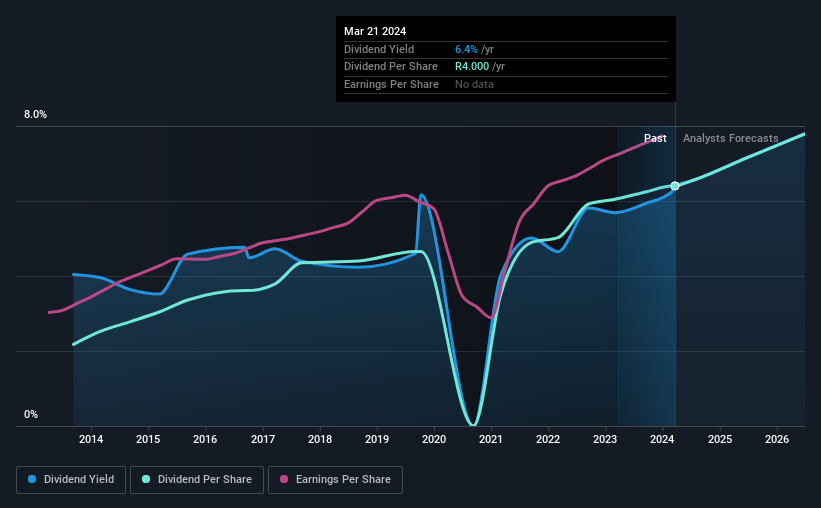Stock Analysis
- South Africa
- /
- Diversified Financial
- /
- JSE:FSR
Just Three Days Till FirstRand Limited (JSE:FSR) Will Be Trading Ex-Dividend

FirstRand Limited (JSE:FSR) stock is about to trade ex-dividend in 3 days. The ex-dividend date is one business day before the record date, which is the cut-off date for shareholders to be present on the company's books to be eligible for a dividend payment. The ex-dividend date is important because any transaction on a stock needs to have been settled before the record date in order to be eligible for a dividend. Meaning, you will need to purchase FirstRand's shares before the 26th of March to receive the dividend, which will be paid on the 2nd of April.
The company's next dividend payment will be R02.00 per share, and in the last 12 months, the company paid a total of R4.00 per share. Last year's total dividend payments show that FirstRand has a trailing yield of 6.4% on the current share price of R062.46. If you buy this business for its dividend, you should have an idea of whether FirstRand's dividend is reliable and sustainable. We need to see whether the dividend is covered by earnings and if it's growing.
View our latest analysis for FirstRand
Dividends are typically paid out of company income, so if a company pays out more than it earned, its dividend is usually at a higher risk of being cut. FirstRand paid out more than half (58%) of its earnings last year, which is a regular payout ratio for most companies.
Companies that pay out less in dividends than they earn in profits generally have more sustainable dividends. The lower the payout ratio, the more wiggle room the business has before it could be forced to cut the dividend.
Click here to see the company's payout ratio, plus analyst estimates of its future dividends.

Have Earnings And Dividends Been Growing?
Stocks in companies that generate sustainable earnings growth often make the best dividend prospects, as it is easier to lift the dividend when earnings are rising. Investors love dividends, so if earnings fall and the dividend is reduced, expect a stock to be sold off heavily at the same time. With that in mind, we're encouraged by the steady growth at FirstRand, with earnings per share up 7.4% on average over the last five years.
The main way most investors will assess a company's dividend prospects is by checking the historical rate of dividend growth. In the last 10 years, FirstRand has lifted its dividend by approximately 11% a year on average. We're glad to see dividends rising alongside earnings over a number of years, which may be a sign the company intends to share the growth with shareholders.
The Bottom Line
From a dividend perspective, should investors buy or avoid FirstRand? Earnings per share have been growing at a reasonable rate, and the company is paying out a bit over half its earnings as dividends. It might be worth researching if the company is reinvesting in growth projects that could grow earnings and dividends in the future, but for now we're on the fence about its dividend prospects.
If you're not too concerned about FirstRand's ability to pay dividends, you should still be mindful of some of the other risks that this business faces. In terms of investment risks, we've identified 1 warning sign with FirstRand and understanding them should be part of your investment process.
Generally, we wouldn't recommend just buying the first dividend stock you see. Here's a curated list of interesting stocks that are strong dividend payers.
Valuation is complex, but we're helping make it simple.
Find out whether FirstRand is potentially over or undervalued by checking out our comprehensive analysis, which includes fair value estimates, risks and warnings, dividends, insider transactions and financial health.
View the Free AnalysisHave feedback on this article? Concerned about the content? Get in touch with us directly. Alternatively, email editorial-team (at) simplywallst.com.
This article by Simply Wall St is general in nature. We provide commentary based on historical data and analyst forecasts only using an unbiased methodology and our articles are not intended to be financial advice. It does not constitute a recommendation to buy or sell any stock, and does not take account of your objectives, or your financial situation. We aim to bring you long-term focused analysis driven by fundamental data. Note that our analysis may not factor in the latest price-sensitive company announcements or qualitative material. Simply Wall St has no position in any stocks mentioned.
About JSE:FSR
FirstRand
FirstRand Limited, together with its subsidiaries, provides transactional, lending, investment, and insurance products and services in South Africa, rest of Africa, the United Kingdom, Europe, Asia, the United States, and Australia.
Adequate balance sheet average dividend payer.

